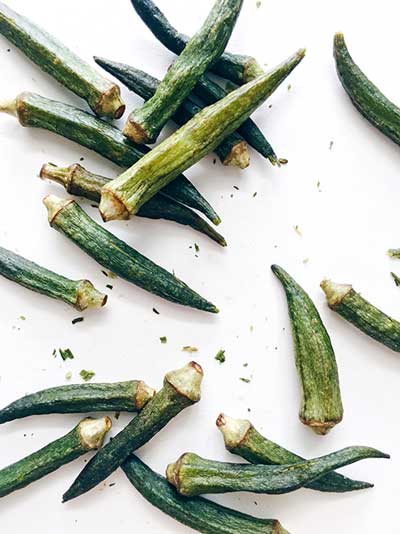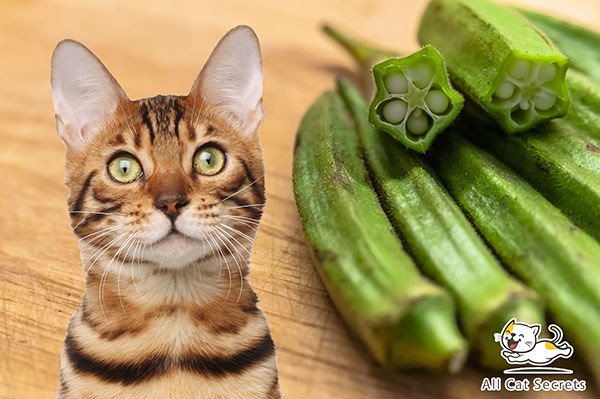It’s not unusual to come across a cat persistently meowing for human foods. Neither is it unusual to come across a cat owner happily sharing people foods with their feline friends.
Admittedly, cats can comfortably eat certain human foods. That’s particularly true for animal-based products like lean meat, and bones. However, the same cannot be said about many plant-based products, including fruits and veggies.
Now, okra is an edible plant loved for its yummy taste and nutritious value. But since okra is a plant-based food and many plants are potentially harmful to cats, it’s natural to find yourself wondering whether it’s a great idea to share this food with your kitto. Like any concerned pet parent in your situation, you may find yourself wondering, can cats eat okra?
The short answer is yes, cats can definitely eat okra. There are numerous plants considered toxic to cats. Fortunately, okra isn’t one of them. Besides its non-toxic nature, okra may actually provide several health and dietary benefits to your cat.
But as with any plant-based foods, okra should only be served to cats in moderation. Giving your kitto too much okra might result in a host of gastrointestinal issues.
Read on as we delve deeper into the health benefits of okra for cats, as well as some side effects to watch out for.
Table of Contents
More About Okra
Before we examine the health benefits and potential side effects of okra for cats, it would be best to begin by understanding exactly what okra is.
Okra, also known as okro, ochro, or ladies’ fingers, is a flowering plant that belongs in the Mallow family, Malvacaea. The plant goes by the scientific name Abelmoschus esculentus. It’s biologically considered a fruit but generally consumed as a vegetable.
Okra is believed to have originated from West Africa, South Asia, or Ethiopia. But today, the plant is widely distributed worldwide, where it’s mainly cultivated for its edible green seed pods. Okra pods are rich in dietary fiber, minerals, vitamins, and antioxidants.

There are two okra varieties, depending on the color of the pods. They include red and green okra. However, both okra varieties taste the same. Also, the red cultivar generally turns green when cooked.
So, can cats have okra?
Again, cats can have Okra. All you’ll need to do is follow the recommended preparation methods and offer the vegetable to your feline friend in moderation.
Now that you’re well-acquainted with okra, the next thing is to understand how your cat stands to benefit from eating this vegetable.
Health Benefits of Okra for Cats
100 grams (3.5 ounces) of raw okra contains the following dietary profile;
- Calories – 33
- Carbs – 7 grams
- Proteins – 2 grams
- Fat – 0 grams
- Dietary fiber – 3 grams
- Water – 88 grams
- Vitamin A – 14% of the recommended daily intake (RDI)
- Vitamin B6 – 14% of the RDI
- Vitamin B9 (Folate) – 15% of the RDI
- Vitamin C – 26% of the RDI
- Vitamin K – 26% of the RDI
- Magnesium – 14% of the RDI
- High protein cat food dry formula with real chicken as the first ingredient
- Natural with prebiotic fiber nourishes specific intestinal bacteria for digestive health
- Wholesome cat food dry kibble with vitamin A and Omega-6 fatty acids to nourish skin and coat
Last update on 2025-01-22 / Affiliate links / Images from Amazon Product Advertising API
Based on the above nutritional profile, the following are the specific benefits your cat can enjoy from okra;
1. Okra May Improve Hydration
Many cats on kibble diets generally do not like to drink water. One way to rehydrate such cats is by giving them solid foods which are already significantly high in water.
Okra is one such food. The vegetable contains up to 88% water, which makes it a potential remedy for dehydrated cats.
2. Okra May Improve Digestion
Like most plant-based foods, okra is rich in dietary fiber.
Dietary fiber falls into two categories. They include soluble and insoluble fiber.
Both soluble and insoluble fiber play an instrumental role in improving digestion.
Soluble fiber mainly provides the nutrients required by gut microbiota. Gut microbiota are gut-friendly microorganisms that live throughout the alimentary canal. They support digestion while also protecting the gut from various digestive issues.
Insoluble fiber moves through the stomach undigested. As such, it helps to bulk up the stool. Bulkier stools translate to more frequent bowel movements, which may help to relieve certain gastrointestinal complications like constipation.
3. Okra May Enhance Weight Loss
The potential weight loss benefits of okra are related to the high content of insoluble fiber in the vegetable.
Diets rich in insoluble fiber are known to create a sense of fullness for longer. Therefore, mixing okra into your cat’s regular food is an ingenious way to curb hunger pangs and food cravings.
Insoluble fiber may also enhance weight loss by reducing the food portions your cat consumes in one sitting. That’s due to their immense filling effects.
And since insoluble fiber isn’t digested, it can prevent the absorption of food substances known to trigger weight gain, such as fats and sugars.
4. Okra May Lower Blood Sugar Levels
This is another health benefit of okra that ties back to insoluble fiber.
As the insoluble fiber in okra passes through your cat’s digestive system undigested, it slows down the absorption of sugars in the animal’s digestive tract.
Numerous studies conducted in mice have proved that okra might, indeed, stabilize blood sugar levels.
- More probiotics per serving
- Natural Enzymes & Fiber
- Use it daily
Last update on 2025-01-22 / Affiliate links / Images from Amazon Product Advertising API
5. Okra May Counteract Blood Cholesterol Surges
Okra is loaded with mucilage, a gel-like substance that binds to cholesterol during digestion.
This binding process causes cholesterol to be excreted with stools as opposed to getting absorbed into the body.
Again, several mice studies have shown that okra might stabilize blood cholesterol levels. Therefore, the vegetable may go a long way in keeping cholesterol-related diseases, such as heart disease, at bay.
6. Okra May Benefit Pregnant Cats
Vitamin B9 (folate) is highly abundant in okra.
Folate is an essential ingredient in prenatal supplements. So, it’s safe to imagine that pregnant cats might also benefit from this nutrient.
Folate helps in lowering the risks of neural tube defects, which may inhibit normal fetal brain and spinal development.
View this post on Instagram
7. Okra May Protect Your Cat from Chronic Diseases
Okra, like most plant-based foods, is rich in antioxidants. Common antioxidants in the vegetable include polyphenols (including isoquercetin and flavonoids), vitamin A, and vitamin C.
Antioxidants are compounds that guard against oxidative damage to cells caused by a surge in the number of free radicals in the body.
Consuming foods high in antioxidants may protect against chronic diseases like cancer, heart disease, diabetes, etc.
Is Okra Safe For Cats?
We’ve reviewed several health benefits of okra for cats. We’ve also mentioned that okra presents no immediate danger to your feline friend. Which means that this vegetable is perfectly safe for your cat.
However, note that the safety of okra for cats mainly depends on the amount of this vegetable that you feed to your kitto. As you’re about to find out, too much okra could induce a range of adverse effects.
Can Okra Be Harmful To Cats?
Although your cat may not drop dead or suffer immediate adverse effects from eating okra, it’s still recommended to tread with caution before feeding this vegetable to your feline friend. That’s because there are possible health issues that okra can cause in cats.
First off, remember that cats are obligate carnivores. Therefore, their diets should predominantly comprise animal-based products.
View this post on Instagram
While cats can snack on plant-based foods like okra from time to time, giving your kitto too much okra might trigger stomach upset. Common symptoms of gastrointestinal upset include nausea, vomiting, diarrhea, and abdominal pain. This underscores the importance of feeding okra to cats in moderation.
There are also chances that your cat could be allergic to okra. Allergic reactions are common the first time you introduce your cat to this vegetable. Depending on how severe the allergy is, you may expect the following symptoms;
Symptoms of gastrointestinal distress, such as vomiting and diarrhea
- Irritability
- Itching and scratching
- Dilated pupils
- Runny eyes and/or nose
Another thing worth noting is that, like most members of the nightshade family, okra produces a toxin known as glycoalkaloid solanine. This chemical is generally harmful to pets. The fact that cats lack certain liver enzymes that can break down various chemicals in their foods means your kitto can easily fall ill from consuming small amounts of glycoalkaloid solanine.
- Works as a dog food topper - For pet parents looking for an alternative to capsules, raw treats, or soft chews, all it takes is a...
- A tasty & body nourishing treat for cats & dogs - Essential fatty acids for a healthy coat.
- Powerful Omega Fatty Acids - This premium fish oil liquid formula is loaded with the healthy Omega-3 fatty acid (with epa and dha)...
Last update on 2025-01-22 / Affiliate links / Images from Amazon Product Advertising API
Maybe you’ve always wondered, is okra a toxic vegetable for cats?
Well, if viewed in terms of its glycoalkaloid solanine content, okra may be considered potentially toxic for cats. But for your peace of mind, it’s important to emphasize that the toxicity of okra for cats depends on how much of the vegetable you feed your cat. In fact, reports of glycoalkaloid solanine toxicity from okra are almost unheard of.
Last but not least, there’s the problem of choking to worry about. Choking risks tend to be higher when feeding raw okra to cats.
Is Okra Bad For Cats?
Okra isn’t bad for cats. Even the side effects highlighted above are quite rare.
The only time okra may become harmful for cats is if you feed the vegetable to your kitto in excess.
Raw Versus Cooked Okra for Cats
Now that okra is perfectly safe and even nutritious for cats, the next dilemma is deciding whether to feed raw okra to your cat or cook the vegetable first.
So, can cats eat raw okra or does raw okra hurt cats?
Cats can eat raw okra, alright. In fact, raw okra contains more minerals and nutrients than cooked okra. However, ensure you wash the vegetable and chop it into smaller portions before giving it to your cat.
View this post on Instagram
Can cats eat cooked okra?
Cats can also eat cooked okra. Cooking is mainly preferred as it softens the vegetable, making it easier for your cat to digest. However, you should generally avoid cooking methods that involve the use of salt, spices, and fats, as these compounds are potentially toxic to cats.
The best way to cook okra for cats is to boil or steam the vegetable.
Can cats eat boiled okra?
As we’ve just mentioned, boiling and steaming are the best ways to cook okra for cats.
Can cats eat okra soup?
Yes, cats can have okra soup. Just be sure to keep the portions low, as too much okra soup might induce diarrhea.
Can cats eat okra seeds?
Be careful about giving your cat okra seeds, especially raw seeds. While these seeds offer several health benefits, they could also be a choking hazard. If feeding raw okra seeds to cats, be sure to smash them to prevent choking risks.
Can cats eat roasted okra?
Roasting hardens okra, making it more difficult to digest. So, it’s best to stick to boiled or steamed okra for cats.
Can cats eat fried okra?
Cats shouldn’t eat fried okra. Frying involves the use of fat. Fat-laden foods are associated with weight gain as well as chronic diseases like heart disease and diabetes.
Can cats eat dried okra?
Rehydration is one of the benefits of okra for cats. So, it defies logic that you’d want to feed dried okra to your kitto. That’s because dried okra is already too dehydrated.

Can cats have pickled okra?
Pickled okra may contain too much salt solution (brine) and vinegar. These substances are both harmful for cats. So, avoid feeding pickled okra to cats.
How to Serve Okra to Cats
The best way on how to give a cat okra is to boil or steam the vegetable. You can then mix it into your cat’s kibble.
How Much Okra Can My Cat Have?
There’s no hard-and-fast rule to follow in determining the right amount of okra to give to your cat.
The only thing to remember is to keep the portions down. That’s especially if feeding okra to your cat for the first time.
It’s also important to note that your cat may develop an okra allergy. Fortunately, there are several alternatives to okra for cats that you might consider. Examples include carrots, cabbages, zucchinis, broccoli, Brussels sprouts, peas, asparagus, pumpkins, and winter squash.
Conclusion
Okra is not only safe for cats. The vegetable is also yummy and nutritious. But like all plant-derived foods, okra should only be fed to cats in moderation.
Checkout Our Favorite Cat Products
1. Best Online Course For Cat Parents
Our favorite: The Cat Language Bible (How to Finally Understand And Speak to Your Cat) – A new form of cat to human communication that many cat owners have dreamed about… but few have actually thought possible.
2. Best Immune Support For Cats
Our favorite: Tomlyn Immune Support – Best Supplement for Cats and Kittens.
3. Best Cat Treats
Our favorites: LIFE ESSENTIALS All Natural Freeze Dried Chicken And Sheba Meaty Tender Sticks – Both are Great.






